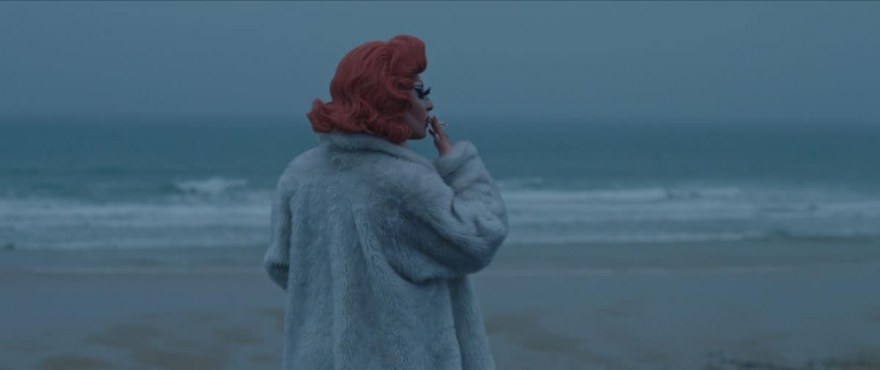Tea time with Un homme mon fils (A man my son)
An interview with Florent Gouëlou, director of Un homme mon fils (A Man My Son)
Who was the inspiration for the character of the father, the projectionist ? What motivated you to explore this father-son relationship?
During my second year at la Fémis, I made a documentary about my mother and her connection to the Algerian War. Two years later, for my final project, I wanted to make a portrait of my father, but this time fictionalizing it. It was a loose portrait. I wanted to mix truth and fiction. His character is inspired as much by others – including yself – as it is by him. For instance, while writing the film, I worked as a projectionist in a movie theater, but without a diploma. I wasn’t able to mount a reel! That’s why both the father and son operate the machine. It seemed pretty typical to me of many father-son relationships: resenting one’s parents and also needing them.
Can you tell us a bit more about the Contentin region where the film takes place? Are you familiar with the region?
I was camping at Vauville, in the Cape of the Hague, when I got the idea for the film. It’s a very wild area that thrusts into the sea, with sand dunes and very peculiar dense thickets of grass. You can really get lost there. People even say that the Biville dunes, where we shot, were used as a moonscape for a 1970s science-fiction film. I imagined a walk with a father and his son. What if the father twisted his ankle amidst those dunes, how would the son be able to bring him back to the car? He’d certainly use the trailer to drag his father to the parking lot. The image was both concrete and a little metaphorical – the weight of the father! In fact, the whole film is built around that scene. We even filmed it, but cut the scene during editing – it wasn’t necessary to the film anymore.
Can you tell us more about the drag queens that the main characters meet along the way?
Cookie Kunty and Jerrie FK are real drag queens whom I met while I was writing the film. They’re played by, respectively, Romain Eck – a first-time actor – and Harald Marlot, who is an established actor. You can see them perform regularly in Paris. Harald was the one who took me to see Jeudi Barré, Cookie’s weekly show, for the first time. (It’s on rue de Lappe near Bastille!) I was fascinated by the incredible discipline involved in their art, which requires you to be an expert in make-up, hair, have a fashion sense, a feel for the stage… It’s a complete art. And yet, to all appearances, it’s “simply” about entertaining people. At first, I was like a wide-eyed kid watching these amazing, hyper-feminine figures. And then when I met the guys behind the characters, I wanted to get to tell their story even more. I wanted to talk about their particular form of freedom, their creativity.
Are you planning any feature films?
Yes, I’m working precisely on the drag queens. I just finished writing a feature film with some of the characters from this film plus some new ones. It’s about a group of friends, in particular the brother and sister from this film. I want to talk about issues that are specific to thirty-somethings, the delicacy of following a professional path – some people are on their second child while others are so far from even thinking about having kids… But most of all, the film tells a love story. How meeting a drag queen can potentially shake up your life.
Have you discovered any advantages that the short film form provides?
Yes, especially for questions of rhythm. For this film, I wanted things to go fast, jumping from one story to the next. That was also something that Louis Richard and I discovered during editing. We tried to make a version where we kept only the bare minimum, and then, in the end, we added very little. As I was writing, I was thinking the whole time about the first time I saw Alfred Hitchcock’s North By Northwest: so many things happened that I left feeling exhausted! In the film, I wanted the viewer to have the sense of a crossing, that at the end they pause to reflect on what has changed and what will not change, revealing the characters through quick little touches.
If you’ve already been to the Clermont-Ferrand Festival, can you give us an anecdote? If it’s your first time, what are you expecting at the Festival?
I expect to meet people and be surprised as a viewer! I’m a ravenous viewer, I’d like to see as many things as possible. I’ve never been to the Festival, but in 2016, I was lucky enough to present Une Histoire commune [A Common Story], the documentary about my mother, at the Festival Traces de Vies in Clermont-Ferrand. The Festival was started by members of l’Unité de formation de travailleurs sociaux who use documentaries as resources for their students. I thought their project was incredible – cinema and social work coming together through films. That’s exactly what we should hope for when we make films – that they’re useful.
Any other public screenings?
The film was shown at the Cinémathèque in September 2017 as part of the La Fémis presentation and in November at the Amiens Festival for La Fémis’ carte blanche. In November the film also won the audience prize at the LGBTQ+ Festival Chéries-chéris in Paris and the prize for best short student film at the LEFEST in Lisbon. Lastly, in January, it was shown at the Festival Premiers Plans in Angers, and at the FIPA in Biarritz in the “Young Creators” category.
Un homme mon fils is part of National Competition F5.









